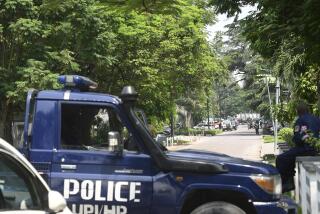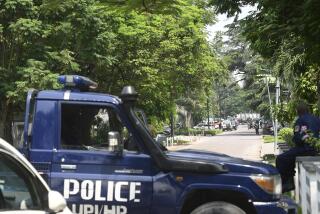Congo’s Government Confirms Kabila’s Death
- Share via
KINSHASA, Congo — Government officials finally confirmed Thursday that Congolese President Laurent Kabila is dead, ending two days of uncertainty over the leader’s fate after he was gunned down in his palace.
In an announcement on state television, Information Minister Dominique Sakombi told the nation that the president had died at 10 a.m. Thursday despite desperate attempts by doctors to save him. He didn’t say where Kabila died. Nor did he give details about the nature of Kabila’s injuries after being shot by one of his own soldiers.
The president had been flown to Zimbabwe’s capital, Harare, and the Congolese government had insisted throughout that he was alive. Foreign diplomats had said as early as Tuesday that the former guerrilla chieftain had died immediately after the palace attack, or soon afterward.
Government officials said Thursday that they had delayed confirming Kabila’s assassination in an attempt to avert a collapse into anarchy in a country racked by more than two years of civil conflict. The fighting has drawn in several nations, with rebel factions backed by Rwanda and Uganda battling to overthrow Kabila, whose key supporters were Zimbabwe, Angola and Namibia.
Political experts and foreign diplomats said Thursday that there may have been a struggle over succession in the past two days, and they warned that further power politics are likely to ensue between Kabila’s relatives and cronies as they battle for permanent control of the presidency.
State television said Thursday that Kabila’s son, Joseph, had temporarily taken over the functions of president of this mineral-rich nation of 50 million people.
“Congo is in mourning,” Sakombi said as he sat in a leather chair in front of a photograph of a smiling Kabila. “He gave entirely the best years of his life for the freedom of the Congolese people.”
As preparations got underway for a state funeral early next week, the government declared 30 days of national mourning. It was likely that Kabila will be buried in his southeastern hometown of Lubumbashi.
The younger Kabila, born during his father’s long exile in East Africa, helped wage the rebellion that ousted veteran dictator Mobutu Sese Seko in May 1997, when the country was known as Zaire. After receiving military training in China, Joseph returned as army chief of staff but soon won a promotion to major general.
He has made no public statements since being named interim president but has met with representatives of foreign missions in Kinshasa, the capital. Initial reports had indicated that he also might have been wounded or even killed in the palace gun battle.
Ready to rid the country of a legacy of nepotism and patronage, some Congolese expressed fear that Joseph--who has scant political experience--may try to parlay his temporary seat in the nation’s top job into a longer-term career.
But some outside observers expressed hope that the younger Kabila will make peace a priority, beginning by reinforcing a 1999 peace accord that called for the withdrawal of all foreign troops from Congo.
“He certainly seems a far smarter cookie than his father,” South Africa-based political analyst Richard Cornwall told reporters Wednesday.
Rebels in eastern Congo appeared to be waiting for Kinshasa to make the next move, but some said they would be encouraged if the younger Kabila accepted the peace deal ending a war that has killed hundreds, displaced millions and almost sliced the country in two.
“We can only hope that whoever takes Kabila’s place will have a more responsible attitude to ending the war,” Patrick Mazimhaka, an advisor to Rwanda’s president, told reporters Thursday.
On the streets of Kinshasa, which remained calm throughout the unfolding drama, life began to return to normal Thursday under a blanket of tension. As darkness fell in advance of a 10 p.m. curfew, truckloads of soldiers took up positions around government buildings.
More to Read
Sign up for Essential California
The most important California stories and recommendations in your inbox every morning.
You may occasionally receive promotional content from the Los Angeles Times.














